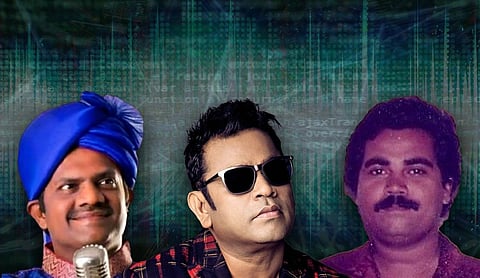

Oscar winning music composer AR Rahman recently courted controversy with his song ‘Thimiri Yezhuda’ from the film Lal Salaam, after he used artificial intelligence (AI) to ‘reconstruct’ the voices of the late singers Bamba Bakya and Shahul Hameed for the song. The song was immediately met with criticism, with a section of people questioning the legal and ethical implications of the move, arguing that employing AI in this manner could devalue the singers’ original work and adversely affect the chances of up-and-coming singers. Others, meanwhile, contended that this was a positive use of AI, appreciating its power to evoke nostalgia and calling the song a respectful tribute to the singers’ legacies.
As the controversy escalated, AR Rahman later clarified that he had gotten permission from the families of both Bamba Bakya and Shahul Hameed to use their voices. Technology is “not a threat if we use it right,” he said, adding that both the families were also fairly compensated. But does the family’s permission alone make the resurrection of a deceased singer’s voice legally and ethically sound?
Lawyers and tech policy experts said this is still a novel topic in the realm of copyright laws. In fact, this incident might set a precedent for AI usage in entertainment, they said, especially with regard to creating art in the likeness of a popular personality. Besides, if Rahman has sought appropriate permission from the parties concerned and there is complete transparency, there is little to be concerned even in ethical terms, they added.
What do copyright laws say?
Experts TNM spoke to said that due to a variety of reasons, the recreation of the late artists’ voices does not result in copyright infringement. Pranesh Prakash, co-founder of Centre for Internet and Society, explained there are three sets of copyright in relation to music — over lyrics, musical compositions, and sound recordings. A singer’s voice is usually treated as a part of the sound recordings, he said.
“Assuming AR Rahman has sought permission from the artists’ families [for ethical reasons] and the owners of copyright [for copyright reasons], I don’t see any problem,” Pranesh said. He contended that legally there was no need for a payment as well, but Rahman was being ethical by paying the families. “This is a novel case, there is no precedent to this. But I do not think this is a case of infringement. Someone trying to copy or recreate the sound of a singer’s voice is not the same as them trying to simply copy what they sang or said. There would be a case for copyright infringement if it was the latter, because then it would be infringing on the sound recording and the literary work,” he said.
Advocate and musician MV Swaroop, meanwhile, cited personality rights to demonstrate why Rahman is not in legal trouble. “While there is no copyright for voices in India, it could come under personality rights, which includes mannerisms, likeness, and so on. Personality rights are owned by a person. After they die, it passes on to their legal heirs, who have the right to licence it how they see fit. If they wish, they can also make money from it. Perhaps this was the case with the singers’ voices Rahman used, and since he got permission from them, he did not do anything illegal,” he explained.
How ethical is it?
One of the main concerns raised by critics is the potential misuse of AI, especially when it is being legitimised by a celebrity like AR Rahman. Even before Rahman used AI to recreate the voices of deceased singers, Instagram meme pages had been doing it with the voice of the late singer SP Balasubrahmanyam. But these two cannot be equated, experts felt, because Rahman had sought prior permission from the families of the artists and a fair compensation was paid to them.
Pranesh pointed out that the audiences were also not deceived, as Rahman had clearly stated upfront that the singers’ voices were recreated using AI algorithms. “With this level of transparency, I don’t see why this is unethical,” he said.
Besides, there have been debates about ethics at every stage of technological advancement in the art world, said Swaroop. He cited autotune as an example, noting how a large section of people had refused to consider it ‘singing’ when it was initially introduced. “But now, autotune in itself has become an aesthetic. After a point, music composers began to request singers to sing a certain way and autotune would be used to make it a synthetic sounding voice,” he said.
The same can be said about synthetic instruments as well, Swaroop said. “Musicians can play a flute on a keyboard, and sometimes it is difficult to tell the difference between original flute music and what is played with a keyboard. I think AI is also just another tool for artists to spur creativity in a different way. For skilled people, AI will be like a different paintbrush with which they can enhance the quality of the art they create,” he added.
Both Pranesh and Swaroop, however, concurred that some level of regulation is necessary for the specific uses of AI. “Personality law is fairly well-developed in the entertainment industry, so I don’t think there is a need to regulate AI for general usage. But there needs to be strong regulation to prevent misuse. In this day and age, it is very easy to use AI to misguide the public about a person’s politics, opinions, and personal views. To avoid such instances, AI usage will need aggressive regulations,” Swaroop said.